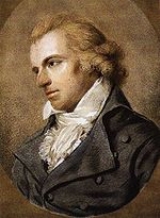
, philosopher
, historian
, and playwright
. During the last seventeen years of his life (1788–1805), Schiller struck up a productive, if complicated, friendship with already famous and influential Johann Wolfgang von Goethe
. They frequently discussed issues concerning aesthetics
, and Schiller encouraged Goethe to finish works he left as sketches.
I feel an army in my fist.![]()
The joke loses everything when the joker laughs himself.![]()
Did you think the lion was sleeping because he didn't roar?![]()
The lemonade is weak, like your soul.![]()
There are three lessons I would write,Three words as with a burning pen,In tracings of eternal lightUpon the hearts of men.![]()
Die Weltgeschichte ist das Weltgericht.![]()
Translation: World history is the world's court.![]()
What one refuses in a minuteNo eternity will return.![]()
What the inner voice saysWill not disappoint the hoping soul.![]()

